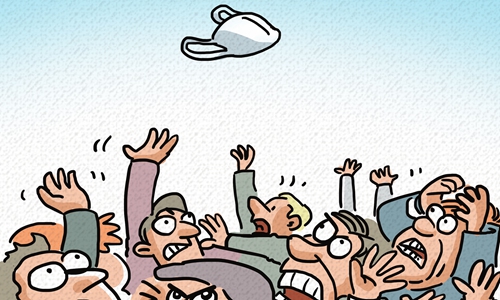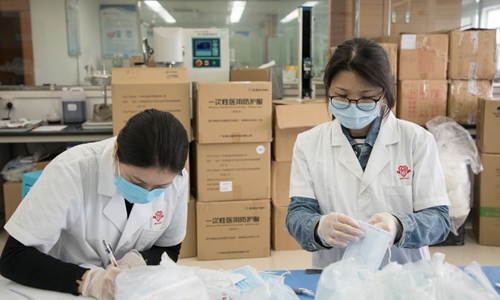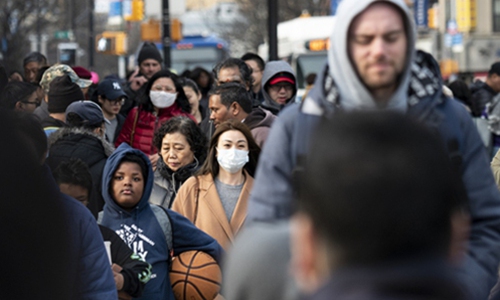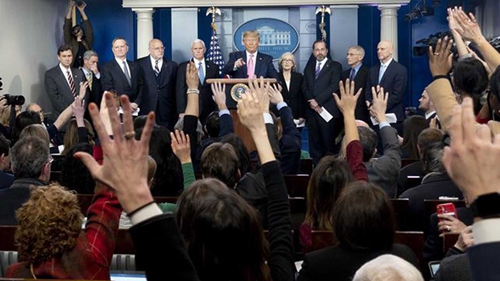
Illustration: Liu Rui/GT
As coronavirus infections in the US continue to skyrocket, Surgeon General Jerome Adams has warned Americans to brace for a hard week of coronavirus deaths, comparable to the attack on Pearl Harbor or the 9/11 attacks. According to Morgan Stanley's prediction, the final number of confirmed cases in the US may reach 570,000. The east and west coasts will reach peak cases in mid-April to May.Under this scenario, the US administration has scrambled globally to secure more anti-epidemic materials, which has sparked tensions with its allies including France, Canada and Germany. Some French officials criticized the US for paying three times the usual price masks destined for delivery to France. Although the masks were eventually shipped to France, the US move caused quite a controversy in France. Some French commentators said the pandemic has sparked "a war for masks" among long-time transatlantic allies, and the selfishness of the US has been completely unmasked.
Germany suffers a similar situation. Recently, 200,000 masks ordered by Berlin were essentially hijacked by the US in Thailand. Andreas Geisel, the German interior minister, accused the US of "an act of modern piracy." He urged the Trump administration to adhere to international trading rules. To secure the transport of surgical masks and protective outfits, the government of Berlin has asked the German military for assistance.
Canada is another victim of modern piracy. On Saturday, Ontario Premier Doug Ford said 3 million masks were held up at the border by US officials. He described it as "absolutely unacceptable." Ford said Canada and the US have always been like a family, yet in face of a common enemy, the US is willing to cut off the supply of medical materials to even its closest allies. The Trump administration's ban on mask exports has severely tested the trust between Canada and the US.
Fortunately, not all American companies have accepted the Trump administration's "America first" approach. 3M warned that banning all export of masks produced in the US would prompt other countries to act in kind. If that happened, the net number of masks available to the US would actually drop. More importantly, halting supplies to other countries has significant humanitarian implications. On Monday, 3M announced it reached an agreement with the US government, which allowed the company to continue sending N95 respirators to Canada and Latin American countries amid the coronavirus pandemic.
This wild approach by the US damages commitment and trust, and will surely further harm its relationship with its allies. Kori Schake, director of foreign and defense policy studies at the American Enterprise Institute, rightfully pointed out that the epidemic is a "leadership test." In face of the pandemic, the US turns out to be self-interested and incompetent. The country can no longer be considered an international leader. Even though the US holds the G7 presidency, Trump did not convene the special G7 summit in response to the COVID-19 until he was repeatedly prodded to do so by French President Emmanuel Macron.
The mask incident once again exposes the flaw of Trump's "America first" policy. Over the past few years, the Trump administration has removed the US from multiple international organizations and eroding multilateralism. In this sense, the "mask war" isn't surprising. To purse its own benefits, the US is constantly willing to sacrifice its allies. This makes the international order more fragile. Former US state secretary Henry Kissinger has warned: "The pandemic has prompted an anachronism, a revival of the walled city in an age when prosperity depends on global trade and movement of people."
Kissinger experienced the darkest moment in human history at young age when his father was targeted by German Nazis. We cannot let the pandemic trigger a similar tragedy again. The US government needs to reflect on and adjust its policies. The "America first" policy has to give way to responsibility and cooperation. The US should demonstrate its due leadership.
The author is a senior research fellow at the Charhar Institute and an adjunct fellow at the Chongyang Institute for Financial Studies at Renmin University of China. opinion@globaltimes.com.cn



